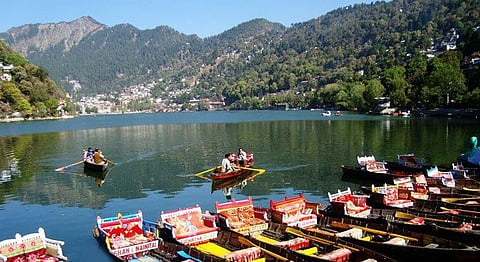
- HOMEGROWN WORLD
- #HGCREATORS
- #HGEXPLORE
- #HGVOICES
- #HGSHOP
- CAREERS
- ABOUT US
- CONTACT US

Every day the world mourns and frets over the loss of another integral natural phenomenon, the coral reefs, the polar icecaps, the last polar bears. But so often while we’re focused on the waning beauty afar, your own back garden has silently withered away. As T.S. Eliot put it ‘This is the way the world ends, not with a bang but a whimper.’ This is the sad reality of Nainital Lake.
Before the onset of the British rule, Naini Lake and the adjacent village were in their prime. Revered as a holy pilgrim site, people would remove their shoes before even daring to enter the town. Today, that reverence is long forgotten. Now it’s a tourist destination, with five-hour long traffic jams and illegal construction, this once sacred space is being mercilessly exploited. The most damaging aspect has been the encroachment on the Sukhatal, a dry lake bed which fills up every monsoon and percolates to provide 50 per cent of the lake’s residual groundwater.
Activists have been working on preventative measures for many years, including filing a PIL in 2012 to declare Naini Lake a living entity, thereby securing its legal rights. Their long term goals are to revive the perennial springs, correct the drainage systems of the area and switch to brick paved roads for better percolation. We spoke to Dr. Vishal Singh, a resident of the area and a member of the Centre for Ecology Development and Research (CEDAR), to find out more. He believes that at the current rate of decline, Naini Tal will stand no chance against the gradual climate change, the absence of percolating water from Sukhatal will result in the the disappearance of the lake within the next ten years or so.
CEDAR is conducting research in the area to help provide climate adaptive and water secure solutions to Nainital and other Himalayan towns, they aim to implement sustainable, indigenous solutions in as many spots as possible to preserve the natural ecosystem. Dr. Singh believes that even with awareness about environmental issues on the rise, people tend to overlook the smaller water bodies and focus more on preservation of rivers and forests, when in fact it is the seemingly insignificant lakes, ponds and reservoirs that are maintaining a delicate unseen balance. With India on a roll when it comes to modernisation, it’s easy to forget how easy it is to create a disturbance, as he says “Smart cities must be ecologically smart, not just economically smart, otherwise soon there will be nothing left”.
In an attempt to bring these issues into public view, the residents of Nainital have organised a peaceful protest on the 3rd of June. In honour of the lake and all she stands for the march will be silent and barefoot to not disturb the ecosystem or the residents. But this is not merely a display of their outrage,, they hope to show their regret that the situation got so out of hand, their silence is their apology to the lake. They march today but say they will continue the protests as long as they must to save Naini Lake and it is their hope that by raising awareness about the issue will help protect the natural beauty, turning it into a scenic haven that can be enjoyed for centuries to come.
To do your part, sign their petition on Change.org to bring awareness to Naini Lake
